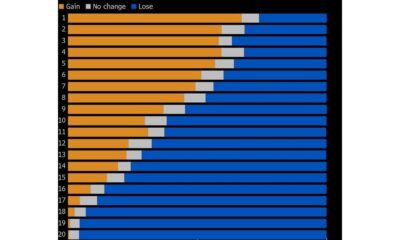Science
UK Physics Departments Face Closure as Funding Pressures Mount

A recent survey conducted by the Institute of Physics (IoP) has revealed that a significant number of physics departments in the UK are at risk of closure due to ongoing funding challenges. Specifically, one in four department heads reported that their departments could face closure within the next two years. The survey indicated that 26% of respondents foresee potential shutdowns, while 60% expect reductions in course offerings.
This alarming trend is compounded by staff cuts, with 80% of departments indicating they are reducing personnel. Many institutions are contemplating mergers or consolidations, which senior physicists believe pose a serious threat to the UK’s future scientific success. A head of physics from one university commented on the dire situation, stating, “Our university has a £30 million deficit. Staff recruitment is frozen, morale is low. Yet colleagues in our school continue to deliver with less and less and under increasing pressure. I’m very concerned that we are close to breaking point.”
Calls for Immediate Government Action
Prof. Daniel Thomas, chair of the IoP’s heads of physics forum and head of the School of Physics and Mathematics at the University of Portsmouth, emphasized the importance of physics in maintaining the UK’s leadership in various strategic areas. He noted that physics underpins technological advancements and is crucial for sectors such as quantum computing, photonics, and green technologies. “If we lose those skills, if we don’t educate the next generation in those skills, then of course we are definitely jeopardising our world leadership as a country – that’s a great concern,” Thomas stated.
To mitigate what they describe as “irreversible damage,” the IoP is urging the government to take immediate steps. This includes increasing funding to support existing laboratories and research facilities, creating an “early warning system” to monitor departments at risk of closure, and addressing pressures on international student recruitment. Long-term, the IoP advocates for significant reforms in higher education funding to ensure that universities can cover the full costs of teaching vital subjects like physics.
Concerns Over Educational Opportunities
Sir Keith Burnett, the IoP’s president and a former chair of physics at Oxford University, stated that while the pressures on public finances are understood, neglecting the situation would be irresponsible. “We are walking towards a cliff edge but there is still time to avert a crisis which would lead not just to lost potential but to many physics departments shutting down altogether,” Burnett warned.
The financial strain on smaller physics departments is particularly concerning. Prof. Thomas pointed out that the declining value of domestic tuition fees and a decrease in international student numbers exacerbate the situation. This could lead to a concentration of physics education in fewer institutions, undermining efforts to widen participation and limiting opportunities for disadvantaged groups.
In response to these challenges, a government spokesperson highlighted plans to increase funding for public research and innovation by more than £22.5 billion annually by the fiscal year 2029-30. This funding represents a 3% real-terms increase compared to the fiscal year 2025-26. “Our £86 billion for public research and development until 2030 will help the UK’s world-class universities continue to lead discoveries,” the spokesperson affirmed.
As the landscape of physics education faces mounting challenges, the urgency for immediate and sustained action becomes increasingly clear. The future of physics departments in the UK hangs in the balance, and the implications extend beyond academia, affecting the nation’s technological and scientific progress.
-

 Politics4 weeks ago
Politics4 weeks agoSecwepemc First Nation Seeks Aboriginal Title Over Kamloops Area
-

 World5 months ago
World5 months agoScientists Unearth Ancient Antarctic Ice to Unlock Climate Secrets
-

 Entertainment5 months ago
Entertainment5 months agoTrump and McCormick to Announce $70 Billion Energy Investments
-

 Science5 months ago
Science5 months agoFour Astronauts Return to Earth After International Space Station Mission
-

 Lifestyle5 months ago
Lifestyle5 months agoTransLink Launches Food Truck Program to Boost Revenue in Vancouver
-

 Technology3 months ago
Technology3 months agoApple Notes Enhances Functionality with Markdown Support in macOS 26
-

 Lifestyle3 months ago
Lifestyle3 months agoManitoba’s Burger Champion Shines Again Amid Dining Innovations
-

 Top Stories2 months ago
Top Stories2 months agoUrgent Update: Fatal Crash on Highway 99 Claims Life of Pitt Meadows Man
-

 Politics4 months ago
Politics4 months agoUkrainian Tennis Star Elina Svitolina Faces Death Threats Online
-

 Sports5 months ago
Sports5 months agoSearch Underway for Missing Hunter Amid Hokkaido Bear Emergency
-

 Politics5 months ago
Politics5 months agoCarney Engages First Nations Leaders at Development Law Summit
-

 Technology5 months ago
Technology5 months agoFrosthaven Launches Early Access on July 31, 2025





















